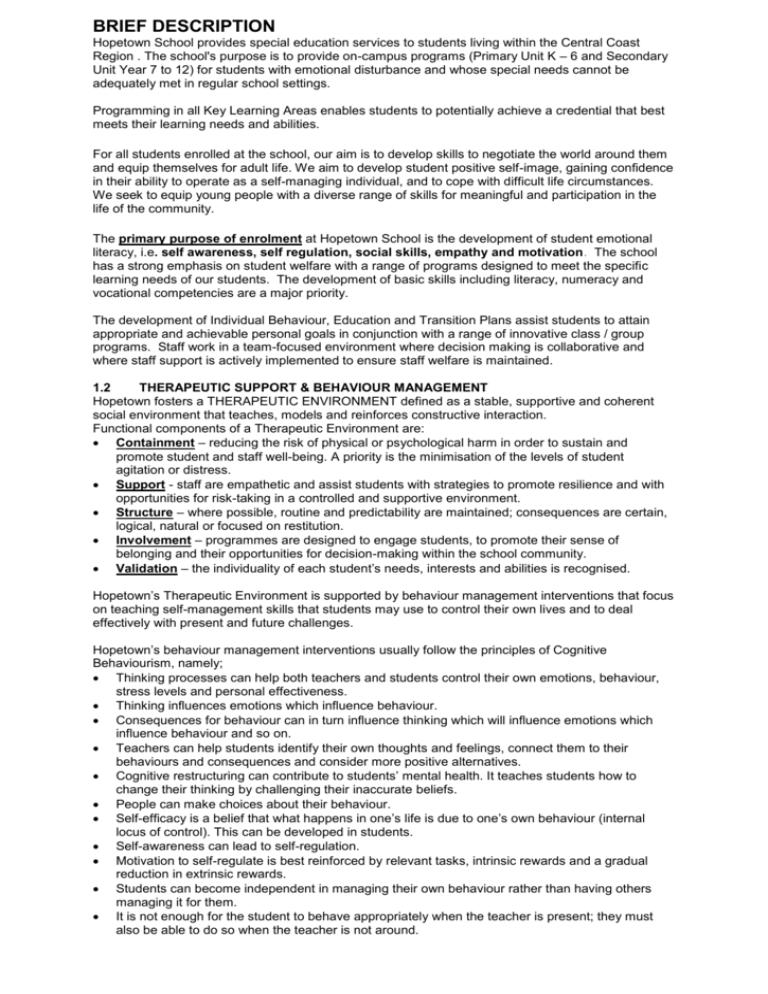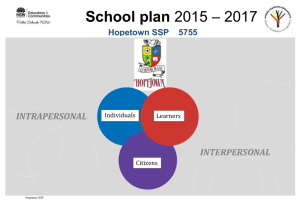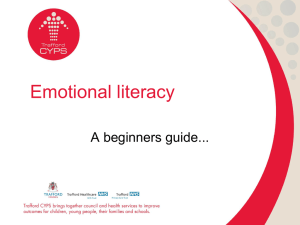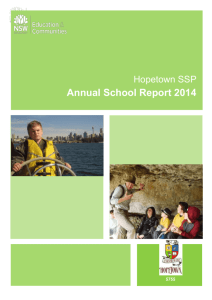Introduction and Purpose
advertisement

BRIEF DESCRIPTION Hopetown School provides special education services to students living within the Central Coast Region . The school's purpose is to provide on-campus programs (Primary Unit K – 6 and Secondary Unit Year 7 to 12) for students with emotional disturbance and whose special needs cannot be adequately met in regular school settings. Programming in all Key Learning Areas enables students to potentially achieve a credential that best meets their learning needs and abilities. For all students enrolled at the school, our aim is to develop skills to negotiate the world around them and equip themselves for adult life. We aim to develop student positive self-image, gaining confidence in their ability to operate as a self-managing individual, and to cope with difficult life circumstances. We seek to equip young people with a diverse range of skills for meaningful and participation in the life of the community. The primary purpose of enrolment at Hopetown School is the development of student emotional literacy, i.e. self awareness, self regulation, social skills, empathy and motivation. The school has a strong emphasis on student welfare with a range of programs designed to meet the specific learning needs of our students. The development of basic skills including literacy, numeracy and vocational competencies are a major priority. The development of Individual Behaviour, Education and Transition Plans assist students to attain appropriate and achievable personal goals in conjunction with a range of innovative class / group programs. Staff work in a team-focused environment where decision making is collaborative and where staff support is actively implemented to ensure staff welfare is maintained. 1.2 THERAPEUTIC SUPPORT & BEHAVIOUR MANAGEMENT Hopetown fosters a THERAPEUTIC ENVIRONMENT defined as a stable, supportive and coherent social environment that teaches, models and reinforces constructive interaction. Functional components of a Therapeutic Environment are: Containment – reducing the risk of physical or psychological harm in order to sustain and promote student and staff well-being. A priority is the minimisation of the levels of student agitation or distress. Support - staff are empathetic and assist students with strategies to promote resilience and with opportunities for risk-taking in a controlled and supportive environment. Structure – where possible, routine and predictability are maintained; consequences are certain, logical, natural or focused on restitution. Involvement – programmes are designed to engage students, to promote their sense of belonging and their opportunities for decision-making within the school community. Validation – the individuality of each student’s needs, interests and abilities is recognised. Hopetown’s Therapeutic Environment is supported by behaviour management interventions that focus on teaching self-management skills that students may use to control their own lives and to deal effectively with present and future challenges. Hopetown’s behaviour management interventions usually follow the principles of Cognitive Behaviourism, namely; Thinking processes can help both teachers and students control their own emotions, behaviour, stress levels and personal effectiveness. Thinking influences emotions which influence behaviour. Consequences for behaviour can in turn influence thinking which will influence emotions which influence behaviour and so on. Teachers can help students identify their own thoughts and feelings, connect them to their behaviours and consequences and consider more positive alternatives. Cognitive restructuring can contribute to students’ mental health. It teaches students how to change their thinking by challenging their inaccurate beliefs. People can make choices about their behaviour. Self-efficacy is a belief that what happens in one’s life is due to one’s own behaviour (internal locus of control). This can be developed in students. Self-awareness can lead to self-regulation. Motivation to self-regulate is best reinforced by relevant tasks, intrinsic rewards and a gradual reduction in extrinsic rewards. Students can become independent in managing their own behaviour rather than having others managing it for them. It is not enough for the student to behave appropriately when the teacher is present; they must also be able to do so when the teacher is not around. Discipline is used to: 1. ensure the physical and emotional well-being of students and staff, 2. create order so learning can occur, 3. promote self-discipline in the form of internalised compliance and 4. encourage self-awareness and self-regulation. A COGNITIVE BEHAVIOURIST MODEL Effective settings, thoughts, feelings, consequences and triggers are related to observed behaviours. Staff can assist students to become aware of this model in the context of daily events and provide skills to increase self-awareness and self-regulation. 1. 2. 3. 4. 5. 6. 7. TRIGGER CONSEQUENCE, or RESPONSE BEHAVIOUR EFFECTIVE SETTINGS Impact of recent or ongoing events Family and care issues History of the behaviour Skill strengths & deficits Physical, psychological, medical status Cognitive processing patterns Beliefs, worldview EFFECTIVE SETTINGS Impetus Teacher response E STRESS Extinguish behaviour/ Defuse stress level Effective Settings Reinforce behaviour/ Escalate stress levels THOUGHTS FEELING EMOTION MOTIVATION VALUES & PURPOSE We actively promote the NSW DET’s “core values” (2004) along with the Commonwealth’s “values for Australian schooling” (2004). These values are incorporated into Hopetown’s 3 expectations (rules): * Be Safe *Be Respectful *Be Responsible The Hopetown School community recognises that the following core values underpin school decision making around the development of the broader curriculum: Resilience: developing a range of coping strategies and self-management qualities such as: recognising strengths and maximising potential; personal responsibility, perseverance and self- discipline Connectedness: actively developing a sense of belonging to, participating in and caring for the school and the wider community Achievement: pursuing and promoting individual endeavour and displaying pride and satisfaction in personal achievement Creativity: valuing original ideas and recognising enterprise and innovation Responsibility: accountability for individual actions towards yourself, others and the community Integrity: being consistently honest and trustworthy Equity: accepting and promoting tolerance, acknowledging diversity and respecting differences. HOPETOWN PROGRAM FOCUS Hopetown School’s primary focus is to support students with emotional / social difficulties to develop personal and social competences (emotional literacy) whilst adopting the above core values. Students attending Hopetown have usually exhausted other educational options and adaptive strategies. The first stage of our role is to ensure that through the range of programs offered students will be able to develop necessary skills and identify goals that best suit their learning needs. In some cases students will require other support placement options due to the programmes and support offered not being able to meet their current specific learning and support needs. These alternatives are from two broad categories : 1. Other Agencies and; 2. Home Schooling. Other students can be supported at Hopetown until they are post - compulsory age (17 years) where there is a range of more suitable community - based training options. PROGRAM LINKAGES Work Skills Engaging, Activity - Based Learning Healthy Lifestyle Attendance & Engagement Recognition & Reward for effort Values Education Development of Emotional Literacy Literacy & Numeracy Social & Personal Competencies Problem Solving Strategies Living Skills HOPETOWN SCHOOL FRAMEWORK PURPOSE: Hopetown School has a primary purpose to provide opportunities for the Social and Emotional Learning (SEL) of students by: supporting students in their development of the Emotional Literacy competences of selfawareness, self-regulation, motivation, empathy & social skills. providing students with opportunities to experience success in academic, social, recreational and vocational areas and to have that success acknowledged. developing in students the foundations of success and happiness, namely, confidence, persistence, organisation, getting along and resilience. (You Can Do It!) VALUES: The Hopetown School community identifies values that closely align with the NSW DoE’s “core values” and the Commonwealth’s “shared values”. Hopetown School believes that the following two conditions are required for these values to be taught: Connectedness - developing a sense of community and belonging. Positive involvement in programs at Hopetown Resilience - developing sel- management, self-confidence & self-respect and nurturing optimism, perseverance & well-being. EXPECTATIONS: * BE SAFE * BE RESPECTFUL * BE RESPONSIBLE THE NSW DoE CORE RULES Core Values in NSW Public Schools Integrity Excellence Respect Responsibility Cooperation Participation Care Fairness Democracy All students in NSW government schools are expected to: • Attend every school day and be in class on time and prepared to learn. • Maintain a neat appearance. • Behave safely, considerately and responsibly • Show respect at all times for teachers, other school staff and helpers • Treat one another with dignity and respect. • Care for property Behaviour that infringes on the safety of others will not be tolerated. LEARNING & TEACHING Learning Environment Student Learning Teacher Learning Programme Planning & Implementation Assessment & Reporting SCHOOL CULTURE Expectations: *BE SAFE *BE RESPECTFUL *BE RESPONSIBLE Developing Emotional Literacy Building Positive Relationships Positive Expectations Safe and Supportive Environment Celebrating Effort and Achievement Commonwealth Values Care and Compassion Doing your best Fair Go Freedom Honesty & Trustworthiness Integrity Respect Responsibility Understanding, Tolerance and Inclusion MANAGEMENT, PLANNING & LEADERSHIP Measurable student outcome targets Focus on continued school improvement Restorative management & support Staff management and support using collaborative decision making Accountability and positive connections with the school community Hopetown School’s Social Emotional Learning Framework Purpose: To develop student Emotional Literacy in 5 domains : SELF AWARNESS, SELF REGULATION, MOTIVATION, EMPATHY AND SOCIAL SKILLS Emotional well-being Success in school life Positive relationships and social responsibility 3 POSITIVE GOALS ▲ GETTING ALONG ORGANISATION PERSISTENCE CONFIDENCE RESILIENCE 5 FOUNDATIONS ▲ ACCEPTING MYSELF TAKING RISKS BEING INDEPENDENT I CAN DO IT WORKING TOUGH GIVING EFFORT SETTING GOALS PLANNING MY TIME BEING TOLERANT OF OTHERS THINKING FIRST PLAYING BY THE RULES SOCIAL RERPONSIBILITY 9 Values: Care & Compassion, Doing your Best, Fair Go, Honesty & Trustworthiness, Freedom, Integrity, Responsibility, Respect & Understanding, Tolerance & Inclusion. 12 POSITIVE HABITS OF THE MIND Promotes Hopetown Discourages SELF DOWNING NEEDING TO BE PERFECT NEEDINDG APPORVAL I CAN’T DO IT I CAN ‘T BE BOTHERED GIVING UP HAVING NO GOALS PLANNING TIME POORLY BEING INTOLERANT OF OTHERS ACTING WITHOUT THINKING BEING INTOLERANT OF LIMITS SOCIAL IRRESPONSIBILITY 12 NEGATIVE HABITS OF THE MIND ▼ 5 BLOCKERS ANGER, POOR FOCUS, PROCRASTINATION, ANXIETY, DEPRESSION, MISBEHAVING DISTURBING HELPLESSNESS LACKING POOR COPING OTHERS CONFIDENCE SKILLS ▼ 3 Negative outcomes Poor mental health Under-achievement Poor relationships Reference: You Can Do It! You Can Do It! and Emotional Literacy EMOTIONAL LITERACY DIMENSIONS SELF AWARENESS SELF REGULATION EMPATHY MOTIVATION GETTING ALONG GETTING ALONG YOU CAN DO IT ORGANISATION ORGANISATION FOUNDATIONS PERSISTENCE PERSISTENCE CONFIDENCE CONFIDENCE RESILIENCE Being tolerant of others CONFIDENCE RESILIENCE RESILIENCE Being tolerant of others SOCIAL SKILLS **Social responsibility **Social responsibility Playing by the rules Playing by the rules Thinking first Thinking first Being tolerant of others Being tolerant of others Being tolerant of others Planning my time Planning my time Setting goals Setting goals Giving effort Giving effort Working tough Working tough Working tough I can do it I can do it I can do it I can do it Being independent Being independent Being independent Being independent Taking risks Taking risks Taking risks Taking risks Accepting myself Accepting myself Accepting myself Accepting myself YOU CAN DO IT POSITIVE HABITS OF MIND **Nine values of Good Character: *Care & Compassion, *Honesty & Trustworthiness, *Responsibility, *Tolerance & Inclusion. *Doing your Best, *Fair Go, *Freedom, *Integrity, *Respect & Understanding, HOPETOWN STUDENT PATHWAYS Student with social / emotional difficulties enrols at Hopetown School - the primary purpose of enrolment is the development of student emotional literacy, i.e. selfawareness, self-regulation, social skills, empathy & motivation. Goals Identified: ongoing monitoring & review P R O G R A M S Literacy & Numeracy Work & Social Skills Social Emotional Learning (SEL), Personal Development, Health & Physical Education Including Sport & Leisure Science & TechnologyLiteracy / Environmental Education Creative Arts Human Society & its Environment inc.Civics & Citizenship Languages / Aboriginal Education DEVELOP STUDENT’S EMOTIONAL LITERACY Individual Education Plans (and PLP’s) Individual Behaviour Support Plans Individual Transition Plans Risk Management Plans P L A N S Home Schooling / Other Agencies Re-integrate to a Mainstream School Continue at Hopetown School Employment or pre – employment training Enrol at another Specialised Setting After completing Year 10: 1. Leave school for employment or vocational training (min. 25 hours/week) or 2. Continue at school – (leaving age, 17 years old) Re-integrate to a Mainstream School HSC Life Skills & VET Studies Employment or pre – employment training Employment or and/or vocational training










